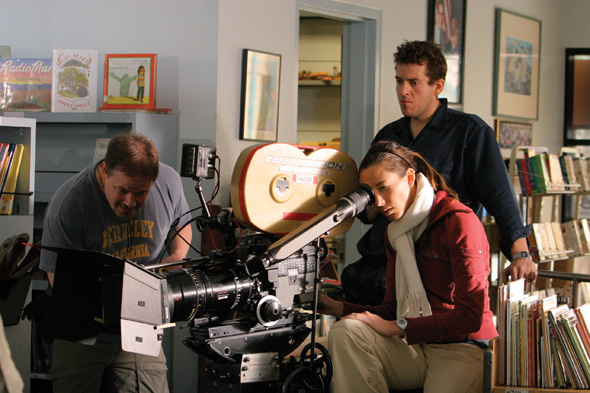Operation Gratitude/Women In Film’s PSA Program
Moments of crises prompt life-altering questions like: “What are you willing to survive for?” That was the query that faced both Carolyn Blashek (founder of Operation Gratitude) and Judith ParkerHarris (a founding member of the Women In Film’s (WIF) Public Service Announcement (PSA) Program) at different points in their lives. Although they took divergent paths to find the answer, the result was the same: giving back.
September 11, 2001 energized Blashek’s passion for public service. But, unable to join the military due to age requirements, she opted to volunteer in the ilitary ounge at , where she met a 20-year veteran on his way to Afghanistan. The despondent soldier, who had just experienced the death of a daughter while going through a divorce, was returning from his mother’s funeral. He felt there was nothing to come back for and didn’t care if he survived. The encounter prompted Carolyn to ask the question: “Soldiers are willing to die on the battlefield. But what are they willing to survive for?” The response was Operation Gratitude, a donation and letter writing program that Blashek began with a few friends, which, by the end of January 2004, had grown to more than 8,000 packages being sent to soldiers during the holidays. Today Operation Gratitude – based out of he Armory in Van Nuys, – sends out 100,000 packages annually to U.S. military in Iraq, Afghanistan and other hostile zones. Ten thousand volunteers from all walks of life pack care boxes and write letters to those in harm’s way. School children also write endearing cards – for some soldiers, the only mail they receive.This grassroots community effort and nonprofit status made Operation Gratitude the perfect candidate for a WIF PSA.

Enter ParkerHarris, whose similar epiphany about life and survival prompted her to use skills in advertising, filmmaking and marketing to give back. ParkerHarris was diagnosed with multiple sclerosis in 1985. Her approach to treatment was a holistic one that included an examination of, and action towards, building a sense of community in her life. That’s why in 1993 she collaborated with line producers Laura Medina and Betsy Pollck to create the WIF PSA Program. The goal was to provide nonprofits with a marketing tool that would enrich the local, national and international community, while also providing opportunities for emerging filmmakers to build their skills and make a contribution to a worthwhile cause.Each WIF PSA is shot in one day on 35mm film and everyone involved donates his or her time.
As WIF PSA Co-hair Varda Hardy observes: “It’s a unity of purpose that really strips away the unnecessary.”

To date, 75 nonprofits, including Operation Gratitude, have benefited from this program and untold numbers of women and men have found a place where they can contribute their filmmaking skills and learn new ones. Local 600 members, like camera operator Alicia Robbins, have used the PSA’s as an opportunity to practice skills at the next level of union membership. Robbins was able to hone her skills as a irector of hotography when she worked on the WIF PSA, Reading to Kids. Her first AC, Geoffrey Chang, a Local 600 loader, got the chance to step up and gain experience as a 1st AC on the nonprofit shoot.
“Women n Film advocates shooting 35mm for their PSA’s,” Robbins says, “And I still feel (film) is one of the easiest formats to shoot, especially with the new stocks – they’re so crisp and the latitude is unbelievable.Not having to have a monitor to look at to judge your exposure and color is quite nice, so it’s a luxury to shoot in 35mm.”
The process by which nonprofits are chosen for a PSA is a competitive one. Each year, nonprofits are selected and pitch their organizations to the WIF PSA Board, which votes on the charity. Four are chosencreative teams of WIF filmmakers hire crew and plan a 30-second spot from pre-production on through post and distribution.

The process would not be possible without the many individuals and vendors who donate their time and services. They include Panavision, which donates 35 mm camera packages and Kodak, which donates film stock.Both companies have been with the WIF PSA Program since its inception, helping to foster a new generation of filmmakers. Other vendors like Deluxe and Technicolor, as well as a myriad of other individuals and companies, also donate services and facilities.
“As long as you’re doing something for free and asking your vendors to do something for free, that is the most expensive time you’ll ever buy,” ParkerHarris observes, emphasizing how much WIF respects and appreciates the contributions made by its industry partners. And because of the high production values of the WIF PSA’s, local television stations have continuously aired the spots, generating a greater awareness of the charity and honoring the WIF creative team. Of the 75 PSA’s produced since 1993, 71 have received awards.
By Marie Rowe and Everlyn Hunter

